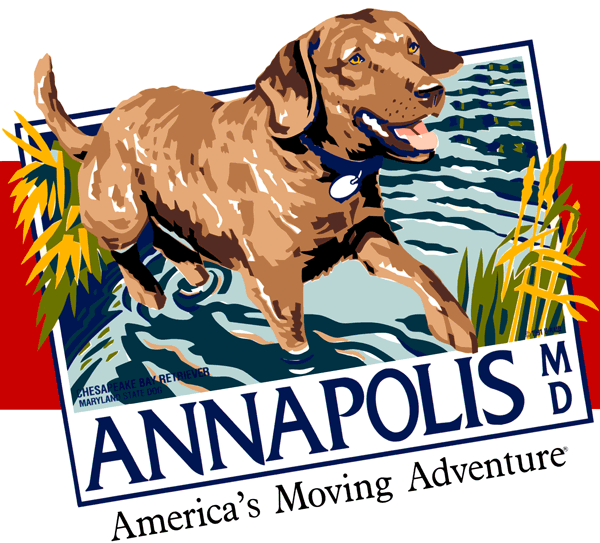Let’s talk about something truly iconic in Maryland—our beloved state dog, the Chesapeake Bay Retriever. Known affectionately as the "Chessie," this breed has been a symbol of Maryland's rich history and outdoor culture for decades. If you're a dog lover or just someone curious about Maryland's unique heritage, this article is for you. We'll dive deep into what makes the Chesapeake Bay Retriever so special, from its origins to its personality traits and everything in between.
Now, before we get started, let me ask you a question: Have you ever wondered why Maryland chose such a distinct breed as its official state dog? It's not just because they're cute (although they totally are). There's a whole lot more to the story, and today, we’re going to uncover it all. So grab your favorite drink, sit back, and let’s explore the world of Maryland's state dog together.
By the end of this article, you'll not only know why the Chesapeake Bay Retriever holds a special place in Maryland's heart but also why it might just become your new favorite breed. Ready? Let's go!
Read also:How Tall Is Nicole Kidman Unveiling The Real Height Of The Iconic Actress
Table of Contents
- The History Behind Maryland's State Dog
- Physical Characteristics of the Chesapeake Bay Retriever
- Temperament and Personality Traits
- Training Tips for Your Chessie
- Health Considerations for Chesapeake Bay Retrievers
- Nutrition and Dietary Needs
- Lifestyle Compatibility with Families
- Famous Chesapeake Bay Retrievers
- Adopting a Chesapeake Bay Retriever
- Wrapping Up: Why the MD State Dog Rocks
The History Behind Maryland's State Dog
Alright, buckle up because we're about to take a trip back in time. The Chesapeake Bay Retriever, or Chessie, as it’s often called, has roots that trace all the way back to the early 1800s. Believe it or not, this breed owes its existence to two puppies who were rescued from a shipwreck off the coast of Maryland. These pups, named Sailor and Canton, were bred with local dogs, and voila—the Chessie was born.
Fast forward to 1964, and Maryland officially declared the Chesapeake Bay Retriever as its state dog. Why? Well, it wasn’t just because of their good looks (though they definitely have those). This breed is deeply tied to Maryland’s waterfowl hunting traditions and its rugged coastal environment. Chessies were bred to be tough, hardworking, and loyal companions for hunters, making them the perfect fit for Maryland's outdoorsy vibe.
Why Maryland Loves the Chesapeake Bay Retriever
There’s something magical about how this breed represents Maryland's spirit. They’re resilient, adaptable, and built to thrive in the harsh conditions of the Chesapeake Bay. Whether it’s retrieving ducks in icy waters or simply being a loyal family pet, the Chessie embodies everything Maryland stands for: strength, resilience, and community.
Physical Characteristics of the Chesapeake Bay Retriever
Talk about a breed that’s built for adventure! Chesapeake Bay Retrievers are medium to large-sized dogs with a muscular build that screams "I can handle anything." Their double coat is one of their most defining features—thick, wavy, and water-repellent, it’s practically designed to keep them warm and dry no matter the weather.
But wait, there’s more. Chessies come in a variety of colors, including brown, sedge, and deadgrass. Each color variation blends seamlessly with the natural surroundings of the Chesapeake Bay, making them nearly invisible to waterfowl during hunting season. Talk about nature’s camouflage!
Key Physical Traits
- Size: Males typically weigh between 65-80 pounds, while females range from 55-70 pounds.
- Coat: Double coat that’s waterproof and resistant to cold water.
- Eyes: Amber or yellow, giving them a distinctive, almost wolf-like appearance.
- Tail: Thick and strong, perfect for swimming and balance.
Temperament and Personality Traits
Let’s be real here—Chessies aren’t just good-looking; they’ve got personality in spades. These dogs are known for their intelligence, loyalty, and protective nature. They form deep bonds with their families and are always ready to protect them if needed. But don’t mistake their protective instincts for aggression—they’re actually quite friendly with people they know and trust.
Read also:Cardi B Boyfriend The Ultimate Guide To Love Relationships And Everything In Between
One thing to keep in mind is that Chessies are working dogs at heart. They need plenty of mental and physical stimulation to stay happy and healthy. If you’re looking for a couch potato dog, this might not be the breed for you. On the flip side, if you love outdoor activities like hiking, swimming, or hunting, a Chessie will be your ultimate companion.
Are Chessies Good with Kids?
Absolutely! Chesapeake Bay Retrievers are known for their patience and affection towards children. Just make sure to supervise interactions, especially with younger kids, to ensure both parties are safe and comfortable.
Training Tips for Your Chessie
Training a Chessie can be a rewarding experience, but it’s not without its challenges. These dogs are smart, but they can also be stubborn at times. The key to successful training is consistency, patience, and plenty of positive reinforcement.
Start with basic obedience commands like "sit," "stay," and "come." Once they’ve mastered these, you can move on to more advanced skills, such as retrieving or agility training. Remember, Chessies love to please their owners, so rewarding them with treats, praise, or playtime can go a long way.
Common Training Challenges
- Independence: Chessies sometimes think they know better than their owners. Stay firm but gentle when correcting bad behavior.
- Energy Levels: This breed has tons of energy, so make sure they get enough exercise before training sessions to help them focus.
- Protectiveness: While it’s great that they’re protective, you’ll want to socialize them early to prevent excessive guarding behavior.
Health Considerations for Chesapeake Bay Retrievers
Like all breeds, Chessies are prone to certain health issues. Some common concerns include hip dysplasia, elbow dysplasia, and progressive retinal atrophy (PRA). It’s crucial to work with a reputable breeder who conducts regular health screenings to minimize the risk of these conditions.
Regular vet check-ups, a balanced diet, and plenty of exercise can also help keep your Chessie in tip-top shape. And hey, don’t forget those annual dental cleanings—no one wants bad doggy breath, right?
How to Spot Potential Health Issues
Keep an eye out for signs like limping, excessive panting, or changes in appetite or behavior. Early detection is key to managing health problems effectively. If you notice anything unusual, don’t hesitate to consult your veterinarian.
Nutrition and Dietary Needs
Feeding a Chessie is all about balance. These active dogs need a diet rich in protein and healthy fats to fuel their energetic lifestyles. High-quality commercial dog food or a homemade diet prepared under veterinary supervision can provide the nutrients they need.
Always remember to portion their meals correctly to prevent overeating. Obesity can lead to a host of health problems, including joint issues and heart disease. And of course, fresh water should always be available.
What to Avoid in Your Chessie’s Diet
- Table Scraps: Human food can upset their stomachs and lead to weight gain.
- Toxic Foods: Chocolate, grapes, onions, and garlic are big no-nos for dogs.
- Low-Quality Ingredients: Look for foods that list real meat as the first ingredient.
Lifestyle Compatibility with Families
Chessies make fantastic family pets, but they do require a certain type of lifestyle. If you live in a small apartment without access to a yard, this breed might not be the best fit. They thrive in homes with space to roam and play, ideally near water where they can swim to their heart’s content.
That said, with proper training and exercise, Chessies can adapt to various living situations. Just be prepared to dedicate time and effort to meeting their needs. Trust me, the love and loyalty they’ll give you in return will be worth every second.
Chessies and Other Pets
Most Chessies get along well with other dogs and pets, especially if they’ve been socialized from a young age. However, always introduce new animals slowly and supervise initial interactions to ensure everyone gets along.
Famous Chesapeake Bay Retrievers
Did you know that some Chessies have achieved fame beyond Maryland’s borders? From movie stars to service dogs, these pups have made their mark in various fields. One notable Chessie is "Sailor," the original ancestor of the breed, whose story of survival inspired generations of breeders.
Another famous Chessie is "Cedar," who served as a therapy dog, bringing comfort to countless people in hospitals and nursing homes. These dogs truly are versatile and capable of achieving greatness in any role they take on.
A Quick Look at Some Famous Chessies
- Sailor: The original Chessie ancestor.
- Cedar: A beloved therapy dog.
- Ripley: A search-and-rescue hero.
Adopting a Chesapeake Bay Retriever
If you’re considering adding a Chessie to your family, adoption is a wonderful option. There are several rescue organizations dedicated to finding loving homes for Chessies in need. Not only will you be giving a dog a second chance, but you’ll also gain a loyal companion for life.
When adopting, make sure to research the organization thoroughly and ask plenty of questions about the dog’s history, health, and temperament. A good rescue will provide all the information you need to make an informed decision.
What to Expect When Adopting
- Initial Adjustment Period: It may take a few weeks for your new Chessie to settle in.
- Training Needs: Even adult dogs may require some retraining depending on their past experiences.
- Veterinary Care: Schedule a vet visit shortly after adoption to ensure your new furry friend is healthy.
Wrapping Up: Why the MD State Dog Rocks
There you have it—the ultimate guide to Maryland’s state dog, the Chesapeake Bay Retriever. From their fascinating history to their lovable personalities, Chessies truly are one of a kind. Whether you’re a seasoned dog owner or a first-timer, this breed has something to offer everyone.
So, what are you waiting for? Dive deeper into the world of Chessies, visit a local breeder or rescue, and see if this incredible breed is the perfect match for you. And when you do, don’t forget to share your story with us in the comments below. We’d love to hear about your journey with Maryland’s state dog!
Until next time, keep exploring, keep learning, and keep loving those Chessies. Cheers!


